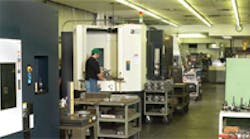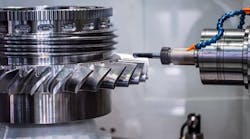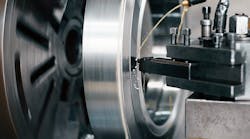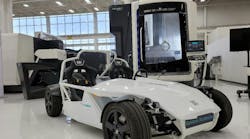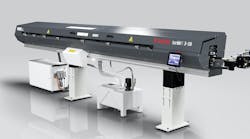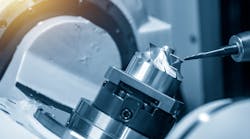Speed is of the essence for moldmaking shops to stay competitive.
However, slashing job leadtimes doesn’t happen overnight because it often requires fundamental process changes and investments in equipment and personnel.
Creative Die Mold and Sipco Molding Technologies are shops that realized this, and they stuck to their guns to become more competitive.
Creative Die Mold (www.creativediemold.com) of Glendale Heights, Ill., put a lot of resources into computers, software, logistics training, hiring the right people and buying the right machinery to produce its molds as fast as possible.
When it re-evaluated its processes, Creative Die Mold found a bottleneck that involved in-coming data. So, to ensure that customer databases came in correctly and were always up-to-date, the shop invested in a large file-server system that is monitored constantly. The shop also put strict policies into place on how data is entered.
“One of our keys to keeping the system clean is absolutely not accepting any e-mailed data,” Tony Knapp, vice president of Creative Die Mold, said. “The minute you allow a customer to e-mail changes, it compromises the integrity of the system, forcing someone to guess what data is the most recent.”
All data travels to Creative Die Mold via a high-speed file transfer protocol (FTP) system. That helps to keep the more than 5,000 yearly customer project databases current and simple to deal with for the shop. The system is based on a master node concept in which everything is kept on a central server to confirm that all changes are simultaneous and that all file usage is concurrent.
Besides the technical upgrades, Creative Die Mold established several process changes to ensure speed. One of its changes was to institute weekly Monday meetings to check on the status of every job in the shop. While most shops may think that stopping to review job status would slow the moldmaking process, Jim Glatczak, president of Creative Die Mold, said the regular reviews have, in fact, kept the shop on track and have speeded up its processes.
Every department head must attend the meetings and is expected to provide complete transparency into what’s happening in his department. Discussions include the jobs that are ahead and behind schedule, where to re-prioritize, where to assign more resources, and where jobs need to be the following Monday to meet delivery promises.
In addition, Richard Denning, a partner at Creative Die Mold, physically checks on every job every Thursday to ensure the processes are moving smoothly and that non-value-added time is being reduced.
In the past, Creative Die Mold spent hundreds of thousands of dollars on machines that didn’t do what they were designed to do. That created serious problems.
So, when it came time to invest in a new Ram EDM to help to reduce leadtimes, the shop created a complex mold part with a compilation of extremely difficult areas to burn, including deep ribs, tight corners and tight tolerances, to test run on three different EDM models.
“Makino (www.makino.com) was the only manufacturer that didn’t have to play with its settings to make the burn even possible,” Glatczak said. Knapp added that the surface finishes provided by the surface finish enhancing system in the machine were amazing and that the machine easily got into the deep ribs that other models could not reach.
Creative Die Mold was so impressed with the Makinos that it purchased two EDNC65S Ram EDMs and added a robot to operate them. The robot loads and unloads parts and tooling for nearly unattended operation, 24/7.
To complement its Makino EDMs, Creative Die Mold needed quality milling machines to tackle such projects as complex graphite pieces and hardmilling.
Until a few years ago, the shop relied heavily on jig borers for steel milling and older milling machines for graphite machining. It still uses the jig borers, but has found that the Makinos could hold the same accuracies with more perks, such as fast tool changes and more flexibility.
Creative Die Mold mills graphite with two SNC64s and an E33 vertical machining centers, and cuts steel on a V33. All the machines have Blum LMT Inc. (www.blumlmt.com) lasers that automatically measure cutters and ensure electrode sizes are accurate.
“Graphite production used to be a bottleneck. If you have a high-tolerance mold where time is limited, the first machining step is to create the graphite to start burning. If the milling machines aren’t fast enough or can’t hold the tolerances, you will never get the process rolling,” Glatczak said.
At Sipco Molding Technologies (www.sipco.com) in Meadville, Pa., pushing the technology envelope has allowed the shop to reduce lead times and to stay one step ahead of the competition.The shop was a pioneer in using EDM in the United States.
Two of its most recent upgrades are a central programming station and the addition of two Makino a61 horizontal machining centers.
The machining centers initially were purchased to increase machining capabilities for building the shop’s client base beyond the telecommunications customers that account for most of its sales. As an added benefit, the machines also significantly reduced machining cycle times, which shortened job lead times.
Sipco’s central programming station lets operators send programs directly to CNC machines on the shop floor.
It houses five programmers separated by glass from the shop floor, but the area is easily accessible, allowing operators to walk in at any time to ask questions or to make changes.
Sipco originally intended to run a high-mix of low-volume custom mold parts on the a61 machining centers, but discovered it also could handle production parts. In fact, the shop runs most of its production parts on the Makinos, but the machines are fast enough to run molds as well.
“The Makino machines have become a central part of our continuous improvement process,” Larry Sippy, president of Sipco, said.
“With our technology and talent, we have the ability to do more than mold work. It’s hard to argue with results. These machines have provided faster throughput and cycle times, improved leadtimes, and made scheduling more reliable.”
Since incorporating the a61s, Sipco has gained improved reliability, accuracy, repeatability and speed/ease of operation.
Most significantly, the shop has reduced cycle times. Prior to buying the machining centers, complete cutting of hydraulic blocks and weldments took 18 min to 20 min. Now the shop cuts these same parts in 10 min to 12 min.
Tool changes alone accounted for significant cycle-time improvements. The parts typically required 20 tool changes.
Tool changes on the a61s take only 2.5 sec from one cut to the next. That results in total tool-change times of less than one minute per part.
Increased tool life is another benefit from the Makino machines. Sipco used one drill per part with its other machines. It now uses one drill for every 20 parts, and the machines have a broken-tool function that is advantageous when running large or complicated molds.
In addition to increased capacity as measured by better cycle times and longer tool life, the high rigidity on Sipco’s new machining centers has expanded the shop’s capability to machine harder materials such as titanium and Inconel.
